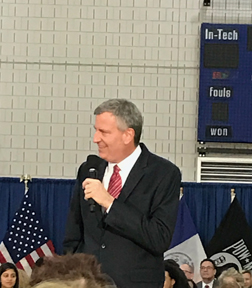Bill de Blasio Holds Town Hall in Northwest Bronx
It almost felt like a cross between a Town Hall and a pep rally. There was no screaming or shouting. Just a gymnasium filled with people who had plenty on their minds and over two hours to get their questions answered. (Those who weren’t picked handed in cards with their queries. They were guaranteed that they would receive follow-up responses.)
A diverse group of constituents from the Northwest Bronx met with Mayor Bill de Blasio and Council member Andrew Cohen, for a forum that fielded concerns from local schools to the current occupant of 1600 Pennsylvania Avenue.
The Mayor was accompanied by a complement of city agency brass, to either follow up on his responses, fill in the gaps, or personally meet those who were having problems.
As Cohen pointed out, Bronxites in this area hadn’t received a mayoral visit since the days of Ed Koch.
 De Blasio greeted the crowd with, “Good evening Northwest Bronx.” There was a communal Pledge of Allegiance, and then lots of reciprocal shout-outs. Assemblyman Jeff Dinowitz warmed up the audience by delivering some unflattering comments about Trump, before thanking the Mayor for “universal pre-K.” Darcel Clark was introduced, and she assured those present, “You have a DA who is here for you.” Cohen, who functioned as the MC, expressed his gratitude to de Blasio and laid out the ground rules: “Vigorous and respectful conversation. No speeches. Questions please.”
De Blasio greeted the crowd with, “Good evening Northwest Bronx.” There was a communal Pledge of Allegiance, and then lots of reciprocal shout-outs. Assemblyman Jeff Dinowitz warmed up the audience by delivering some unflattering comments about Trump, before thanking the Mayor for “universal pre-K.” Darcel Clark was introduced, and she assured those present, “You have a DA who is here for you.” Cohen, who functioned as the MC, expressed his gratitude to de Blasio and laid out the ground rules: “Vigorous and respectful conversation. No speeches. Questions please.”
Up for re-election, de Blasio did some politicking by running down his accomplishments after observing, “Everyone who is here in this room is here for a good reason.”
Noting the current stats for high school graduates (72.6 percent), he added, “Fifteen years ago, it was under 50 percent.” He stated, “Seventy thousand kids are in pre-K.” De Blasio talked about police and community relations, affordable housing for seniors and vets, getting a rent freeze in place, and traffic safety. Then he told the audience, “I look forward to your questions.”
The first inquiry was about the potential impact of Betsy DeVos on public education. De Blasio voiced concern about a reduction of federal revenue due to proposed tax cuts for the wealthy. “We have reserves,” he said. “Now we fear Washington, D.C. more than loss of revenue.”
The hyperlocal issues ran the gamut from school overcrowding to landlord abuse. On lack of local parking, de Blasio shifted the conversation to, “I think we need to expand mass transit.” Regarding the Bronx River Greenway, he offered, “We’ll follow up.” Several people spoke about homelessness, including existing dismal facilities for male and female veterans. “We got 700 people off the streets,” the Mayor said, while emphasizing the need for permanent housing and “getting people back into communities.” A request for more police officers who speak Bengali was an opportunity for de Blasio to mention that there are “900 Muslim members of the NYPD.” In promoting his successes, de Blasio lamented, “Good news doesn’t travel as well or as fast as bad news.”
The bigger themes of the evening reflected a generalized fear — about what was going to happen to the Affordable Care Act, how to protect the undocumented, and the future of the country.
De Blasio referenced the irony of people complaining about “Obamacare” in 2009, and, “Now they want it.” He suggested, “I urge everyone in this room to fight. Every additional person who signs up — it makes it harder to get rid of.”
The pointed request to follow Seattle’s action, and divest all of New York’s funds from those entities who finance the DAPL pipeline, got an open-ended answer. “New York City has reached out to New York financial institutes. We have applied positive pressure. If they refuse…”
De Blasio’s response trailed off.
There were numerous healthcare and education professionals on site. They consistently underscored their concerns for immigrant youngsters and their mental health. One teacher commented with palpable concern, “We have students who are living in fear right now.”
Speaking to the status of New York as a sanctuary city for 500,000 undocumented residents, de Blasio affirmed, “We’re all here together. We’re not making our law enforcement people into immigration agents. The only funding they can cut is from Homeland security. If they actually want to try it, we’ll take them to court.” Later he reiterated, “In anything controlled by the City of New York, people are safe. The vast majority of the undocumented are contributing to the life of our city.”
“What should city people do to defend against Trump initiatives?” de Blasio was asked.
Asserting that “something’s been unleashed by the Trump campaign,” de Blasio ticked off a list of actions. “Sign up people for health insurance; sign up for idNYC; report acts of bias or hatred. People need to see the consequences.”
New York is the media capital of the world,” de Blasio maintained. “Everything we do here gets magnified.” Later, a woman challenged the Mayor about the dismal state of the country. She told him emphatically, “Our country is in crisis. I want you to use your bully pulpit on a daily basis.”
Taking issue with her prediction that the country was in an irrevocable downward spiral, de Blasio replied:
“America is fighting back. I agree with your urgency, but people are standing up and using all the tools of democracy. It’s a difficult period, but not impossible.”
Let’s hope so.
Photo: Marcia G. Yerman



